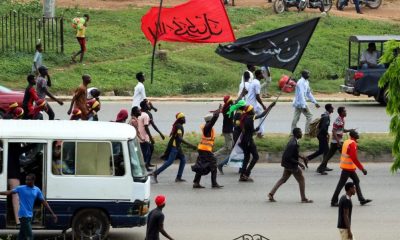Business
‘More expensive than subsidy?’ — Is FG’s N5,000 transport grant dead on arrival?
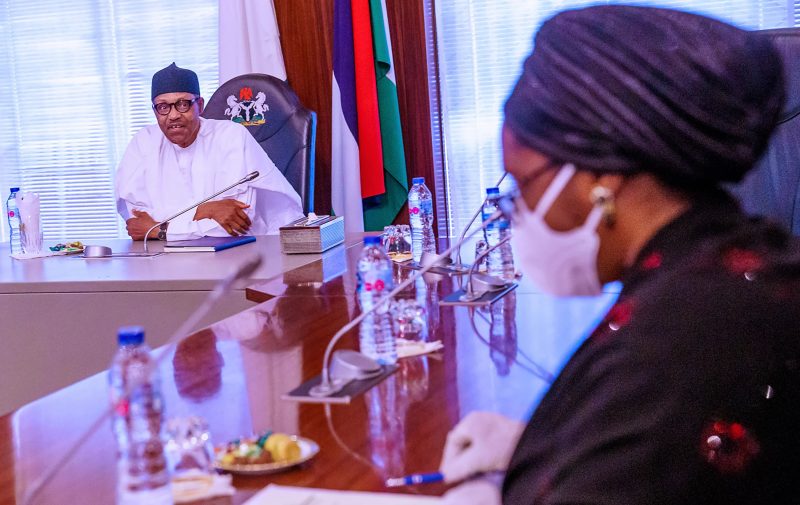
Zainab Ahmed, minister of finance, budget, and national planning, said on Tuesday that the federal government would remove fuel subsidy by 2022 and replace it with a N5,000 grant for the poorest Nigerians. According to her, about tens of millions Nigerians would benefit from the transport grant.
Following the revelation, Nigerians online and offline have weighed in on the policy, raising quite a number of reservations about the policy, which is billed to take off sometime between February to June 2022.
While some say the policy is inevitable, following the fiscal condition of the Nigerian states, others differ, emphasising that Nigeria is an oil-producing country and should not have to pay so much for petrol.
TheCable on Wednesday reported that Nigeria had the third-lowest petrol pump price in Africa, after Angola and Algeria. This position strengthens the argument for keeping oil subsidies — if other oil-producing states are doing it, Nigeria can keep subsidies too.
On the flip side, some Nigerians believe the removal of subsidies is long overdue. This school of thought claims that Nigeria is at least 10 years late to the party. They see subsidies as unsustainable, inefficient, and responsible for the lack of competition in the oil sector.
READ ALSO:
- Religious Leaders in the North appeal to Davido for help
- Alleged N11.8b scandal: Ayu vows to probe past PDP administrations
- Tinubu visited me to seek support for presidential ambition – Yakasai
However, a large chunk of both schools of thought does not entirely believe in the idea of giving N5,000 transport grants to the poorest Nigerians. Some say the grant will be more expensive than the existing fuel subsidy and would have an even worse impact on state finances.
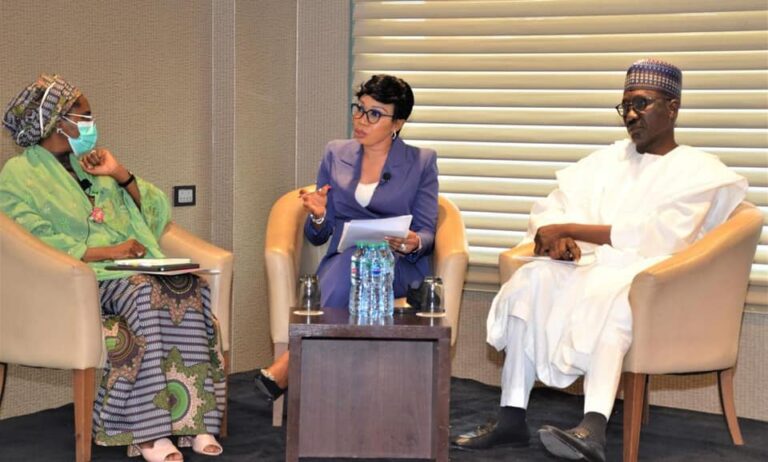
Zainab Ahmed taking questions at NDU launch event
TheCable has reviewed all we know about this policy to draw informed conclusions on the subsidy removal and replacement plan.
You may have seen claims online suggesting that N5,000 for 40 million Nigerians monthly, would amount to N2.4 trillion, which is more than the existing subsidy payments of about N1.8 trillion per year. Mathematically, this is correct. But according to what we know about the policy, this is not exactly the case.
Speaking at the launch of the Nigeria Development Update (NDU) hosted by the World Bank, the minister of finance, said the number of beneficiaries would vary between 20 million and 40 million.
During her opening speech, she said: “Ahead of the target date of mid-2022 for the complete elimination of fuel subsidies, we are working with our partners on measures to cushion potential negative impact of the removal of the subsidies on the most vulnerable at the bottom 40% of the population.
“One of such measures would be to institute a monthly transport subsidy in the form of cash transfer of N5,000 to between 30 – 40 million deserving Nigerians.”
For 30 million Nigerians, the cost of maintaining this grant per year will be N1.8 trillion, which is also as bad as the subsidy payment itself. Going by what the minister initially said, the cost of the grants is worse. This drives the argument for keeping subsidies.
However, the minister also said during the panel discussion that the grant may not get to all 40 million Nigerians, suggesting that the final numbers will be dependent on available resources. This means a lot less than N1 trillion may eventually be spent on delivering the policy.
READ ALSO:
- KPOFIRE: Woman leaves her three children in a boat, returns to meet them all burnt
- There is no basis begging Buhari to release Sunday Igboho – Afenifere
- Special forces eliminate bandits terrorizing Kaduna-Abuja road
TIME: FEBRUARY OR JUNE 2022?
Another challenge with the project is the timeline; questions abound on when exactly this project would kick-off. According to the Petroleum Industry Act, subsidies should be removed by February 2022. But according to the 2022 budget, subsidies will be paid till June, 2022.
Two contradicting pieces of legislation? Not exactly. When the PIB was signed by President Muhammadu Buhari, the president set up an implementation committee to execute PIA within the space of one year.
The committee, in line with the ministry of finance, budget and national planning, made room for subsidies till June 2022, but the removal could be as early as February to save the government some subsidy funds.
Will December, January, February be enough time to convince Nigerians on subsidy removal? Time will tell.
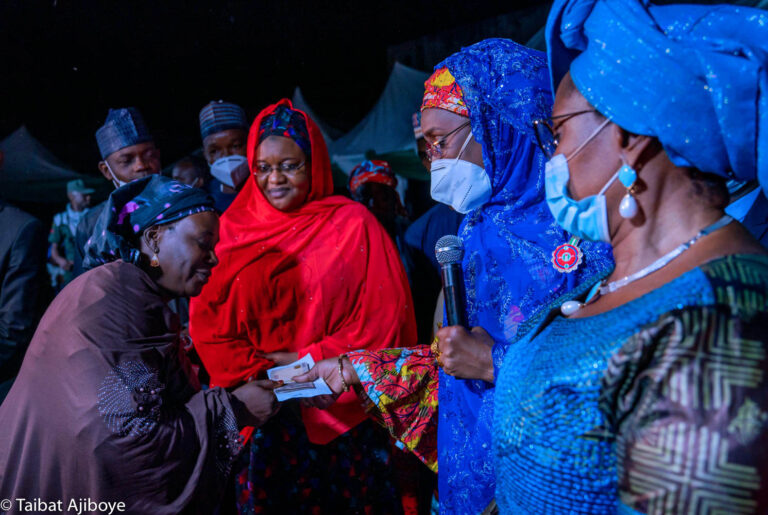
The beneficiaries would be identified as they were with other SIPs under the Buhari government, but payments will not be made physically like this
HOW WOULD THE 40M NIGERIANS BE SELECTED?
Yes, this is a recurrent question. But according to the minister, the selection process will build on the existing conditional cash transfer register used by the office of the vice-president in administering payments to poor and vulnerable Nigerians in the past.
The minister said the government will be working with state governments and non-governmental organisation (NGO) to ensure that the people who get the grant are the ones who actually get the funds.
READ ALSO:
- Kidnappers of Ondo N-Power teachers, principals, demand N35m
- Proscription of Bandits: FG has succumbed to blackmail – Gumi
- Diezani loses bid to recover $40m jewellery seized by Nigerian govt
DEAD ON ARRIVAL?
The World Bank recommended that Nigeria “implement a large-scale (covering 25% to 50% of the population) and time-bound targeted cash-transfer program to mitigate impacts of high inflation and the PMS subsidy removal.”
It also asked the government to “redirect savings from PMS subsidy to finance primary health, basic education, and rural connectivity projects” with the country.
The bank estimates that subsidy savings could be as high as N3 trillion per year. If that is the reality, then Nigeria can go ahead with the cash transfers, and still have some money to finance primary health, basic education, and rural connectivity projects.
However, going by 2019 figures, subsidy savings will be less than N2 trillion, while N5,000 to 40 million Nigerians will amount to N2.4 trillion. At that rate, there will be no savings for other projects recommended by the bank.
Dead on arrival? A lot will depend on the final implementation plans.
TheCable
Railway
NRC suspends Warri-Itakpe train after multiple engine failure

NRC suspends Warri-Itakpe train after multiple engine failure
The Nigerian Railway Corporation (NRC) on Thursday announced the suspension of its Warri-Itakpe train service, after it experienced multiple technical issues.
The standard gauge train was said to have broken down midway on Tuesday, creating some panic situation among passengers on board.
It said in a statement that the decision to suspend the train operation would allow its technical team “to conduct a full audit, resolve all identified issues, and restore safe and reliable service.”
The NRC statement signed by Henrietta Eregare of the NRC Public Relations Department, read in part, “The Nigerian Railway Corporation (NRC) wishes to inform the general public and our valued passengers that a significant disruption occurred on the Warri-Itakpe rail line on Tuesday, April 9, 2025, due to multiple technical issues involving a train engine failure.
“Management has consequently suspended train services on the route for 72 hours.
“The disruption commenced at approximately 1:38pm and affected both the 8am departure from Warri and the 2pm train from Itakpe.
“Emergency recovery protocols were immediately activated but also suffered a setback due to engine failures.”
It recalled how the corporation swiftly arranged for the safe evacuation of all passengers through road transportation with adequate security presence.
“Passengers were guided off the affected train to waiting cars approximately 500 meters from the track.
It stated, “Some Passengers chose to arrange their own transportation before the arrival of official recovery vehicles—a decision NRC understands given the delay.”
The corporation also disclosed that adequate arrangements had been made for a full refund of the value of tickets to passengers involved in the disrupted trains.
Those interested in using their tickets for future trips can take advantage of the revalidation option, according to the NRC.
“Refund and revalidation process is available on our online ticketing platforms, via our customer service lines, and at all NRC stations,” the statement added.
It expressed regret for the inconvenience caused by the unexpected disruption.
It said, “The Nigerian Railway Corporation takes full responsibility and is actively working to restore normal operations as quickly as possible. We remain committed to the safety, reliability, and comfort of our passengers.”
Business
BREAKING: Dangote Refinery slashes petrol price to ₦865

BREAKING: Dangote Refinery slashes petrol price to ₦865
The Dangote refinery has informed marketers and its customers of a downward review of its ex-gantry loading cost to ₦865 per litre.
The new price is N15 less than the facility’s previous price of N880 per litre sold Wednesday.
Our correspondent learnt that the refinery alerted its clients via a notification sent out on Thursday morning.
Our correspondent gathered that the Dangote refinery informed its customers in a notice sent out on Thursday morning.
Remember that marketers had exclusively informed that the 650,000-barrel Dangote refinery was expected to reduce its petrol loading costs by the end of this week, further adding to the decline in fuel prices.
Chinedu Ukadike, the National Publicity Secretary of the Independent Petroleum Marketers Association of Nigeria, reassured the public about the price drop while responding to the Federal Executive Council’s direction on the naira-for-crude arrangement.
Following an initial delay, the Federal Executive Council directed on Wednesday that the suspended Naira-for-Crude arrangement with local refiners be fully implemented.
It stated that the initiative with local refineries is not a temporary measure but a “key policy directive designed to support sustainable local refining”.
READ ALSO:
- Naira down to N1,620 in parallel market
- INEC names Sam Olumekun as acting chairman
- My daughter worked for Buhari for 5 years without pay – Buba Galadima
The Ministry of Finance announced this in a statement published on its official X handle titled “Update on the Crude and Refined Product Sales in Naira Initiative”.
The statement was released following a meeting on Tuesday between the Minister of Finance, Wale Edun, and representatives from Dangote Refinery, a major beneficiary of the agreement, to review progress and address ongoing implementation matters.
The committee stated that the policy is not a temporary measure but rather a long-term strategy to reduce Nigeria’s reliance on foreign currency for petroleum.
It further stated that the effort is not a one-time or limited intervention but rather a fundamental policy direction aimed at promoting sustainable local refining and bolstering energy security.
The statement read, “The Technical Sub-Committee on the Crude and Refined Product Sales in Naira initiative convened an update meeting on Tuesday to review progress and address ongoing implementation matters.
“The stakeholders reaffirmed the government’s continued commitment to the full implementation of this strategic initiative, as directed by the Federal Executive Council.
“Thus, the Crude and Refined Product Sales in Naira initiative is not a temporary or time-bound intervention but a key policy directive designed to support sustainable local refining, bolster energy security, and reduce reliance on foreign exchange in the domestic petroleum market.”
BREAKING: Dangote Refinery slashes petrol price to ₦865
Business
Naira down to N1,620 in parallel market

Naira down to N1,620 in parallel market
The naira yesterday depreciated to N1,620 per dollar in the parallel market from N1,575 per dollar on Tuesday.
But the Naira appreciated to N1,611.55 per dollar in the Nigerian Foreign Exchange Market (NFEM). Data published by FMDQ, showed that the indicative exchange rate for the naira fell to N1,611.55 per dollar from N1,612.24 per dollar on Tuesday, indicating 69 kobo appreciation for the naira.
Consequently, the margin between the parallel market and NFEM rate narrowed to N8.45 per dollar from N37.24 per dollar on Tuesday. Currency traders attributed the depreciation of the naira to increased demand and low supply factors.
READ ALSO:
- INEC names Sam Olumekun as acting chairman
- My daughter worked for Buhari for 5 years without pay – Buba Galadima
- Panic as 3 headless bodies found in Ondo river
Mr. Danjuma Sanni, a currency trader, told Vanguard that there had been a continuous increase in demand for the dollar, which intensified yesterday. “There has been increasing demand for the dollar with low supply. Though people still sell their dollars, the demand is still increasing more than the supply.
“Today, I bought a dollar at N1,600 and sold it for N1,620.
“This morning a dollar was sold at N1,650 and closed between N1,610 and N1,620.” The trader envisages the exchange rate to trade below N1,600 per dollar at the end of the week.”
Naira down to N1,620 in parallel market
-

 metro1 day ago
metro1 day agoWhy Obi’s 15-year-old supporter is in prison — Lawyer
-

 metro2 days ago
metro2 days agoNigerian woman admires polygamy, seeks co-wife for husband
-

 Education1 day ago
Education1 day agoEasiest way to pass UTME, by JAMB registrar Oloyede
-
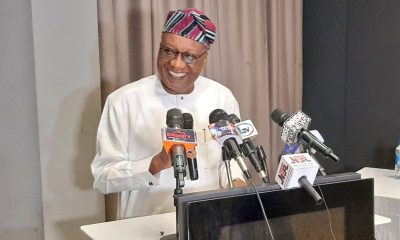
 metro1 day ago
metro1 day agoINEC names Sam Olumekun as acting chairman
-

 Sports3 days ago
Sports3 days agoChampions League: Arsenal stun Real Madrid 3-0 as Rice delivers free-kick masterclass
-
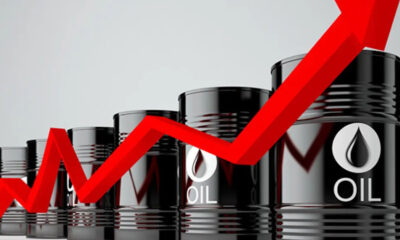
 Business1 day ago
Business1 day agoFear over 2025 FG revenue target after oil price crash
-

 metro2 days ago
metro2 days agoPerish your 2027 presidential ambitions, APC tells Atiku, el-Rufai
-

 Business2 days ago
Business2 days agoKenyan, Nigerian emerge winners at Pan-African Re/Insurance Journalism Awards in S’Africa





